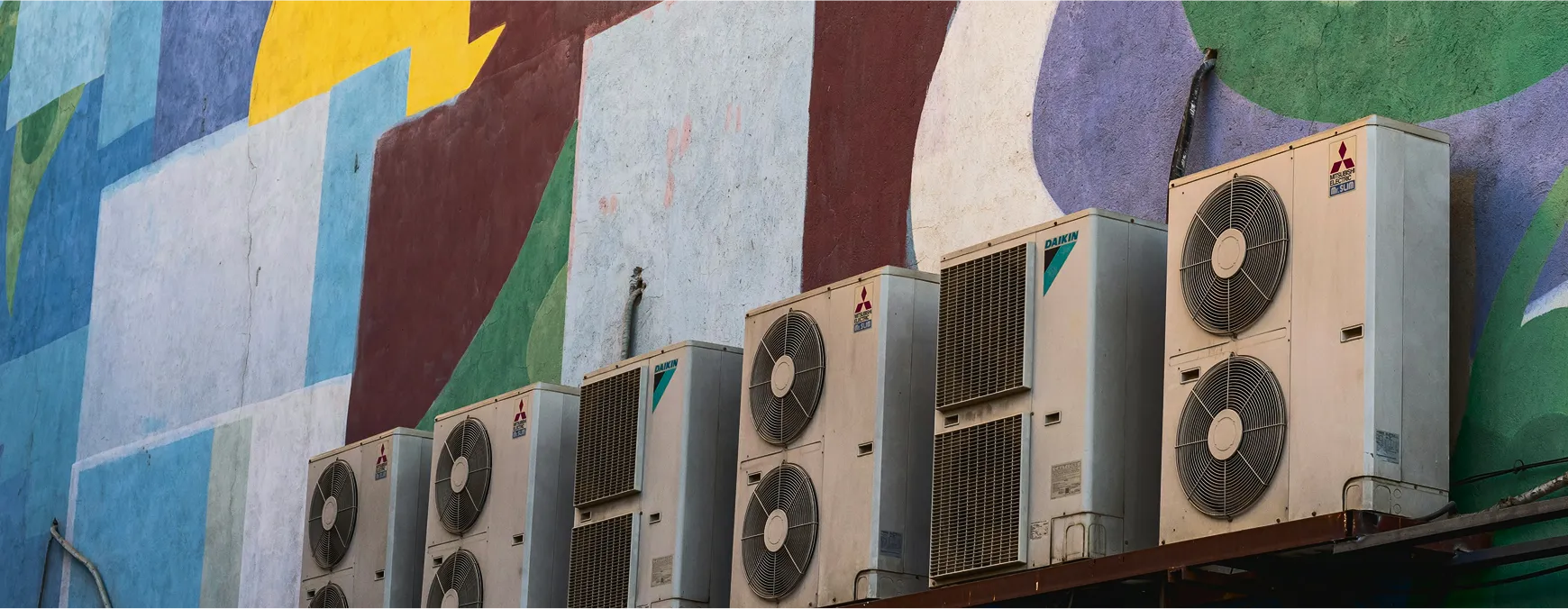Comparing Heat Pumps & Geothermal with Traditional HVAC Systems
Discover the smarter way to heat & cool your home! Our guide compares Heat Pumps vs. Traditional HVAC on efficiency, cost, and performance. Which system wins for your needs?

Heat Pump vs. AC and Furnace: A Texas Homeowner’s Guide to Choosing the Right HVAC System
Choosing a new HVAC system for your home in the Greater Houston area is a major decision. It’s not just about staying comfortable through our sweltering summers and unpredictable winters; it’s a long-term investment in your home’s value, energy bills, and overall comfort. You're likely weighing traditional furnaces and air conditioners against newer technologies like air-source heat pumps and geothermal systems, and the sheer volume of information can feel overwhelming.
How do you cut through the noise to figure out which system truly makes sense for your family and your budget?
At Goode Air Conditioning & Heating, we've spent over four decades helping families in Humble, Kingwood, and Atascocita navigate this exact challenge. We believe an informed decision is the best decision. This guide isn't about selling you one system over another. It's about giving you a clear, honest comparison based on hard data and our local experience, so you can feel confident in your choice.
Understanding Your HVAC Options: The Key Players
Let's start by clarifying what each system does. While they all heat and cool your home, they work in fundamentally different ways.
Traditional HVAC: The Tried-and-True Combo
This is the setup most Texans are familiar with. It’s a split system using two distinct units:
- Air Conditioner (AC): Works by pulling heat from inside your home and transferring it outside, cooling the indoor air.
- Furnace: Creates heat by burning a fuel source (usually natural gas or propane) or using electric resistance coils, then distributes the warm air through your ductwork.
It's a reliable system, but as we'll see, it's often not the most efficient.
Air-Source Heat Pumps: The Efficient All-in-One
Think of a heat pump as a two-way air conditioner. In the summer, it functions just like a standard AC, moving heat from inside to outside. But in the winter, it reverses the process, extracting heat from the outdoor air (even when it's cold) and transferring it inside your home.
This process of moving heat rather than creating it is the key to its remarkable efficiency. It’s a single unit that provides both heating and cooling.
Geothermal Systems: The Ultimate in Efficiency
Geothermal heat pumps operate on the same principle of heat transfer, but instead of using the outside air, they use the earth. A few feet below the ground, the temperature remains remarkably constant year-round—typically between 50-60°F here in Texas.
A system of underground pipes, called a ground loop, circulates a water-based solution that absorbs this constant ground temperature. In the summer, the system pulls heat from your home and deposits it into the cooler earth. In the winter, it pulls heat from the earth and moves it into your home. This stability makes geothermal systems incredibly efficient and consistent.
The Financial Equation: Upfront Costs vs. Long-Term Savings
This is where the decision often gets complicated. A lower sticker price today can sometimes lead to higher bills for years to come.
Upfront Investment
- Traditional HVAC (AC + Furnace): This combination generally has the lowest initial installation cost.
- Air-Source Heat Pump: The upfront cost is typically higher than a traditional AC of the same tonnage, but because it replaces both the AC and furnace, the total investment can be very competitive with a full traditional system replacement.
- Geothermal System: This is the most significant upfront investment. According to the International Energy Agency (IEA), installation costs can range from $15,000 to $45,000, largely due to the need for excavation or drilling to install the ground loop.
However, the initial cost doesn't tell the whole story. The federal government offers significant incentives to encourage homeowners to adopt high-efficiency systems. Through the Inflation Reduction Act, you may be eligible for a tax credit of up to 30% of the total cost for qualifying heat pump and geothermal installations. This can dramatically reduce the net cost of these advanced systems.
Long-Term Operational Savings
This is where heat pumps, especially geothermal, truly shine.
- Traditional HVAC: A high-efficiency gas furnace might be around 95% efficient, meaning 5% of the energy is lost. A standard AC will have a SEER (Seasonal Energy Efficiency Ratio) rating, typically from 14 to 22.
- Air-Source Heat Pump: According to the U.S. Department of Energy, an air-source heat pump can slash your electricity use for heating by as much as 50% compared to electric furnaces and baseboard heaters. When you consider both heating and cooling, an ENERGY STAR-certified unit can deliver 30-60% savings on your total energy bill.
- Geothermal System: The efficiency of geothermal is in a league of its own. Because it uses the stable temperature of the earth, it can achieve an efficiency rating of up to 600%. For every one unit of electricity used to run the system, it can move up to six units of heat. This translates into massive savings, with many homeowners seeing a payback period of 5 to 10 years on their initial investment.
Performance in the Texas Climate: Beating the Heat and Handling the Cold
A common question we hear is, "Will a heat pump keep my home warm enough during a Texas cold snap?" It’s a valid concern, especially given the memory of recent winter freezes.
The answer is a resounding yes, thanks to modern technology. While older heat pumps could struggle in near-freezing temperatures, today's models are different. The National Renewable Energy Laboratory (NREL) has confirmed that cold-climate heat pumps can operate efficiently in temperatures as low as 5°F. For those rare nights when temperatures dip even lower, many homeowners opt for a dual-fuel system, which pairs a heat pump with a small backup furnace that only kicks on when absolutely necessary. This gives you the best of both worlds: incredible efficiency for 99% of the year and peace of mind for the extreme 1%.
For cooling, both air-source and geothermal heat pumps are exceptional performers. In fact, because a geothermal system deposits heat into the cool ground instead of the hot summer air, it can often cool your home more effectively and consistently than a traditional air conditioner on the most brutal 100°F+ days. As you evaluate your options, consider Goode Air's expertise in installing energy-efficient cooling and heating systems tailored for our unique climate.
Environmental Impact: Your Home’s Carbon Footprint
For many homeowners, reducing their environmental impact is a growing priority. Here, the choice is clear.
Traditional furnaces burn fossil fuels, releasing carbon dioxide directly into the atmosphere. Air conditioners also have a significant carbon footprint due to their electricity consumption.
Heat pumps, on the other hand, are powered by electricity and don't burn anything. They simply move heat. This makes them a much greener choice. According to the EPA, a geothermal heat pump system can reduce greenhouse gas emissions by 44% to 72% compared to traditional HVAC systems. By choosing a heat pump, you’re not just lowering your bills; you’re investing in cleaner air for our community.
Lifespan & Maintenance: A Look at Long-Term Reliability
Your HVAC system is a workhorse, and you need it to be reliable for years.
- Traditional AC: 10-15 years
- Furnace: 15-20 years
- Air-Source Heat Pump: Around 15 years, as it runs year-round for both heating and cooling.
- Geothermal System: The indoor components have an expected lifespan of 25 years, while the underground ground loop can last for 50+ years.
While an air-source heat pump may have a similar lifespan to a traditional system, a geothermal unit offers unparalleled longevity. The ground loop is protected from the elements, making it an incredibly durable, long-term infrastructure investment in your home. Regular HVAC maintenance is crucial for all system types to ensure they reach their maximum expected lifespan and operate efficiently.
Making the Right Choice for Your Humble Home
So, which system is right for you? There's no single answer—it depends on your priorities.
- Choose a Traditional AC & Furnace if: Your primary concern is the lowest possible upfront cost and you have access to affordable natural gas.
- Choose an Air-Source Heat Pump if: You're looking for a great balance of excellent year-round efficiency, significant long-term savings, and a moderate upfront investment. It's an ideal upgrade for most Texas homes.
- Choose a Geothermal System if: You plan to stay in your home for the long term and your priority is the absolute lowest operating cost, greatest longevity, and smallest environmental footprint. The upfront investment is high, but the long-term rewards are unmatched.
Frequently Asked Questions About Modern HVAC Systems
Q: Are heat pumps noisy?
Modern air-source heat pumps are designed for quiet operation, with sound levels comparable to or even quieter than new, high-efficiency air conditioners. Geothermal systems are even quieter, as the main unit is located indoors without a loud outdoor fan.
Q: Does geothermal installation destroy my yard?
While there is drilling or trenching involved, professional installers like the team at Goode Air take great care to minimize disruption. The landscape is restored after the ground loop is installed, and soon after, you won't even know it's there.
Q: Can a heat pump work with my existing ductwork?
In most cases, yes. A professionally conducted evaluation of your ductwork is part of any HVAC installation process to ensure it's properly sized and sealed for optimal performance, regardless of the system you choose.
Q: I’ve heard I need a backup heater with a heat pump in Texas. Is that true?
It's often recommended as a "peace of mind" feature. A dual-fuel system pairs an electric heat pump with a gas furnace for backup. The heat pump handles the vast majority of your heating needs efficiently, and the furnace only engages in the most extreme cold, ensuring you're always comfortable without relying on less-efficient electric resistance heat strips.
Let's Find Your Perfect Fit
Navigating the world of HVAC technology can be complex, but you don't have to do it alone. For over 40 years, our family has been "Taking Goode care of our customers" by providing honest advice and expert service.
If you’re ready to explore which system makes the most sense for your home, family, and budget, we invite you to schedule a consultation with one of our comfort specialists. We’ll provide a no-pressure assessment and a clear, transparent quote, helping you make a decision you'll feel great about for years to come.
Call or text (281) 446-6719 today for fast, reliable service—Goode Air Conditioning & Heating, Inc. is here to keep your home comfortable and worry-free.

Customer Testimonials
See why so many homeowners trust Goode Air Conditioning & Heating, Inc.—our 4.8-star Google rating and hundreds of happy customers speak to the quality, care, and service we deliver every day.


